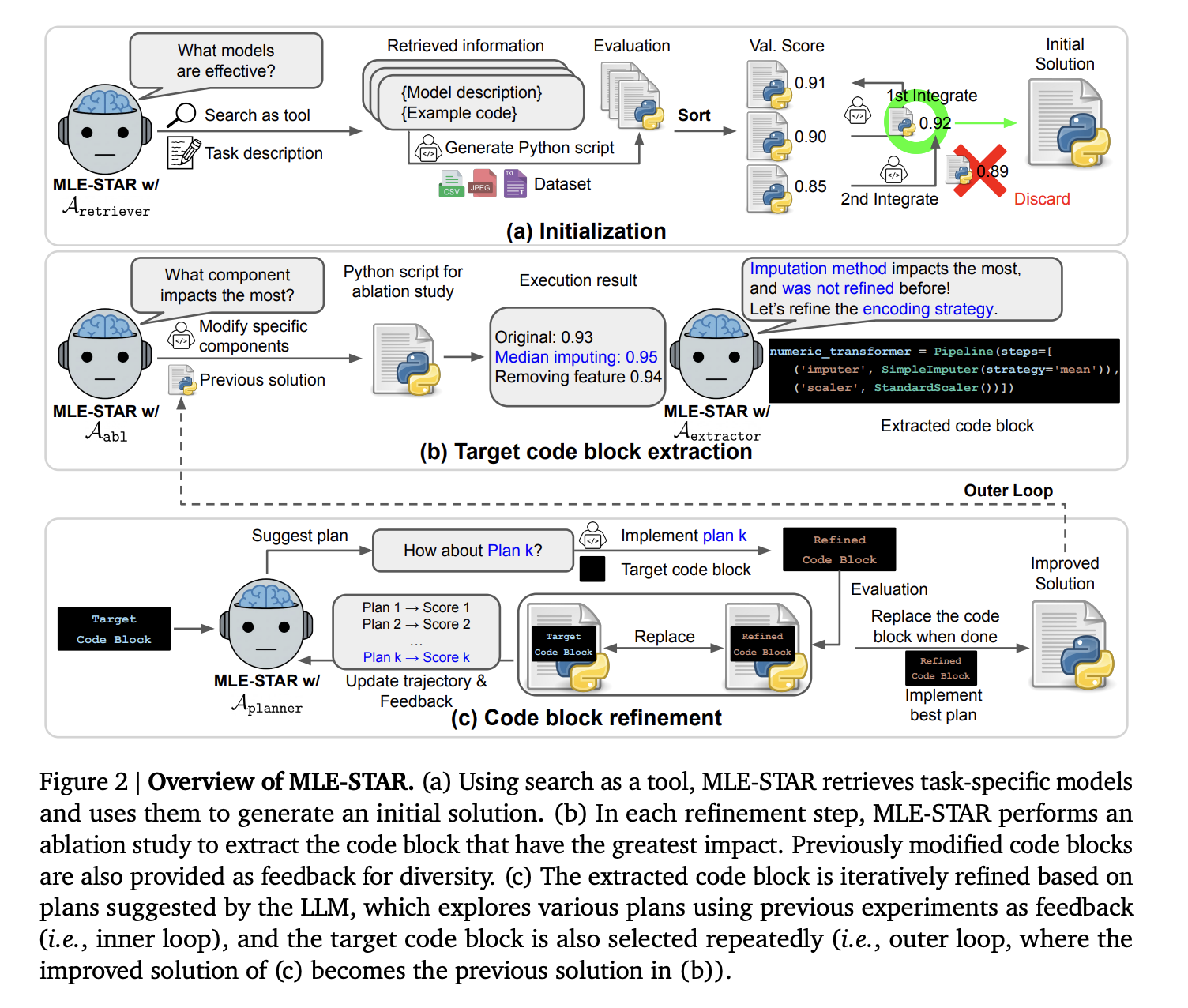August 4, 2025
5 min read
Asif Razzaq
Google's MLE-STAR automates ML pipeline design with web search, targeted refinement, and robust error handling, outperforming prior agents.
Google AI Releases MLE-STAR: A State-of-the-Art Machine Learning Engineering Agent Capable of Automating Various AI Tasks
MLE-STAR (Machine Learning Engineering via Search and Targeted Refinement) is an advanced agent system developed by Google Cloud researchers to automate complex machine learning pipeline design and optimization. Leveraging web-scale search, targeted code refinement, and robust checking modules, MLE-STAR achieves superior performance across a variety of machine learning engineering tasks—significantly outperforming previous autonomous ML agents and human baselines.The Problem: Automating Machine Learning Engineering
While large language models (LLMs) have advanced code generation and workflow automation, existing ML engineering agents face key challenges:- Overreliance on LLM memory: Agents tend to default to familiar models (e.g., scikit-learn for tabular data), missing cutting-edge, task-specific approaches.
- Coarse “all-at-once” iteration: Prior agents modify entire scripts in one step, lacking focused exploration of pipeline components like feature engineering, data preprocessing, or model ensembling.
- Poor error and leakage handling: Generated code often contains bugs, data leakage, or fails to utilize all provided data files.
- Outer Loop (Ablation-driven): Conducts ablation studies on evolving code to identify the pipeline component (e.g., data prep, model, feature engineering) with the greatest impact on performance.
- Inner Loop (Focused Exploration): Iteratively generates and tests variations for the identified component using structured feedback. This approach enables deep, component-wise exploration, such as extensively testing categorical feature extraction methods rather than indiscriminately altering the entire pipeline.
- Debugging Agent: Automatically detects and corrects Python errors until the script runs successfully or maximum attempts are reached.
- Data Leakage Checker: Prevents information leakage from test or validation samples into training.
- Data Usage Checker: Ensures maximal utilization of all provided data files and modalities, enhancing model performance and generalizability.
- MLE-STAR more than doubles the rate of top-tier “medal” solutions compared to prior agents.
- On image tasks, it favors modern architectures like EfficientNet and ViT over older models such as ResNet, leading to higher podium finishes.
- The ensemble strategy further boosts performance by combining winning solutions.
- Search as Foundation: Real-time web retrieval keeps MLE-STAR up to date with new model types.
- Ablation-Guided Focus: Surgical improvements target the most impactful pipeline components.
- Adaptive Ensembling: Intelligent exploration of stacking, meta-learners, and optimized weighting surpasses simple averaging.
- Rigorous Safety Checks: Automated error correction, data leakage prevention, and full data usage improve validation and test outcomes.
- Human experts can inject descriptions of cutting-edge models to accelerate adoption of new architectures.
- Built on Google’s Agent Development Kit (ADK), MLE-STAR supports open-source adoption and integration into broader agent ecosystems, with official samples available here.
- Google AI Releases MLE-STAR: A State-of-the-Art Machine Learning Engineering Agent Capable of Automating Various AI Tasks
- AI-Driven Crypto Scams Surge 456%: Experts Warn No One Is Safe
- How to Use Google Gemini for Smarter Crypto Trading
MLE-STAR: Core Innovations
MLE-STAR introduces several breakthroughs:1. Web Search–Guided Model Selection
Instead of relying solely on internal training data, MLE-STAR performs external web searches to retrieve state-of-the-art models and code snippets relevant to the task and dataset. This anchors solutions in current best practices rather than just LLM memory.2. Nested, Targeted Code Refinement
MLE-STAR employs a two-loop refinement process:3. Self-Improving Ensembling Strategy
MLE-STAR designs, implements, and refines novel ensemble methods by combining multiple candidate solutions. Beyond simple voting or averaging, it explores advanced strategies like stacking with custom meta-learners and optimized weight search.4. Robustness through Specialized Agents
Quantitative Results: Outperforming the Field
MLE-STAR’s performance was validated on the MLE-Bench-Lite benchmark, covering 22 challenging Kaggle competitions across tabular, image, audio, and text tasks:| Metric | MLE-STAR (Gemini-2.5-Pro) | AIDE (Best Baseline) |
| :––––––––– | :–––––––––––– | :–––––––––- |
| Any Medal Rate | 63.6% | 25.8% |
| Gold Medal Rate | 36.4% | 12.1% |
| Above Median | 83.3% | 39.4% |
| Valid Submission | 100% | 78.8% |
Technical Insights: Why MLE-STAR Wins
Extensibility and Human-in-the-Loop
Conclusion
MLE-STAR marks a significant leap in automating machine learning engineering. Its workflow—starting with web search, followed by ablation-driven targeted refinement, adaptive ensembling, and specialized safety agents—outperforms prior autonomous ML agents and many human experts. Its open-source codebase empowers researchers and practitioners to integrate and extend these capabilities, accelerating productivity and innovation.For more information, check out the Paper, GitHub Page, and Technical Details.
Source: Originally published at Marktechpost on August 2, 2025.

